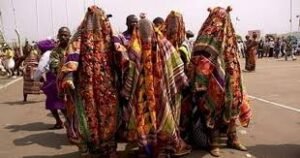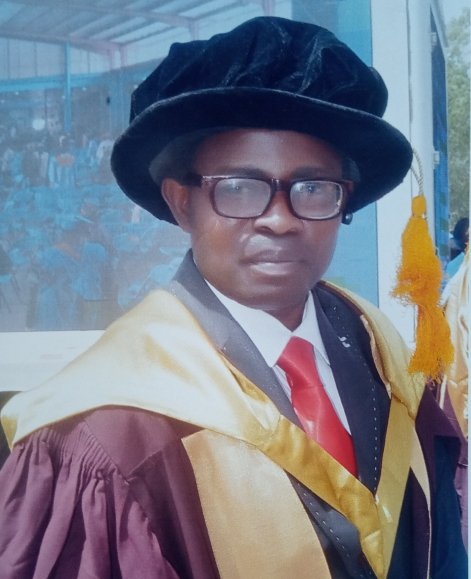Dr. IDOWU OLUFEMI AMOS, a senior lecturer in sociology at Federal University, Lokoja Kogi State, brings his academic expertise to bear on the Oro festival controversy in an exclusive interview with our correspondent, Korede Abdullah, on Friday. Dr. Amos provides nuanced perspectives on why the Oro festival remains a vital part of Yoruba heritage, exploring its role in shaping community, identity, and cultural values. Excerpts:
AHR: As a sociologist, can you shed light on why the Yoruba people still hold onto the Oro festival despite the influence of modernity?
Yes, the Oro festival remains part and parcel of the Yorùbá cultural identity. Despite modernization, the Yoruba people continue to value their traditional heritage. The Oro festival serves as a connection to their ancestors, reinforcing community bonds and cultural continuity.
AHR: But isn’t the Oro festival seen as restrictive, especially towards women? Doesn’t this contradict modern values of equality and inclusivity?
That’s a valid point. However, within the Yoruba context, the Oro festival’s restrictions are not about oppression, but rather about respecting tradition and maintaining social order. Women have their own roles and festivals, like the Osun Osogbo festival. It’s about cultural nuance, not discrimination.
AHR: How do you respond to critics who view the Oro festival as “backward” or “primitive”?
That perspective reflects a limited understanding of cultural diversity. The Oro festival is a symbol of Yoruba resilience and adaptability. It coexists with modernity, demonstrating that tradition and progress are not mutually exclusive. In fact, the festival has evolved, incorporating modern elements while retaining its core significance.
AHR: What role does education play in preserving the Oro festival’s relevance?
Education is crucial. By teaching Yoruba history, culture, and language in schools, we ensure younger generations understand the festival’s significance. This helps them appreciate their heritage and balance traditional values with modern perspectives.
AHR: Can you explain why the Oro Festival should not be used to scare people away from participating in protests in Lagos and its environs?

Absolutely. As I have said earlier, the Oro Festival is a cultural and traditional practice that holds significant importance for the Yoruba people. However, using it as a tool to intimidate or discourage people from exercising their constitutional right to protest is unjustifiable. It’s essential to separate cultural practices from politics and ensure that citizens’ rights are protected.
AHR: But some argue that the festival’s timing, especially in August, coincided with planned protests, potentially disrupting social order.
That’s a valid concern, but we must recognize that protests are a fundamental aspect of democratic expression. Using cultural festivals to suppress dissenting voices undermines democratic principles. Instead, government should engage with protesters, address their grievances, and ensure public safety.
AHR: How do you think the government can balance cultural sensitivity with the need to maintain law and order?
AHR: The government should prioritize dialogue and collaboration with protest organizers and community leaders. This approach will help prevent potential conflicts and ensure that both cultural practices and democratic rights are respected.
AHR: What message would you like to convey to the public regarding the Oro Festival and protests?
I urge citizens to exercise their rights responsibly and respectfully. Let’s distinguish between cultural practices and political expression. The government should protect both, rather than using one to suppress the other. By promoting mutual understanding and respect, we can foster a more inclusive and democratic society.
AHR: Finally, what message would you like to convey to those interested in learning more about the Oro festival?
I’d say approach with an open mind and respect for cultural diversity. Recognize that tradition is not static; it evolves. The Oro festival is a vibrant example of Yoruba culture’s enduring relevance in contemporary society.
“Oro Festival, an Integral Part of Yoruba Cultural and Spiritual Heritage” – Chief Arike Olorisha
In the midst of the ongoing controversy surrounding the Oro festival in Lagos and other Yoruba regions, Chief Arike Olorisha, PhD, a UK-based traditionalist and psychologist, sheds light on the cultural significance and misconceptions surrounding this ancient celebration. In an exclusive and candid conversation with our correspondent, Korede Abdullah, on Friday, Chief Olorisha shares her insightful perspectives.
AHR: The Oro Festival has generated controversy. What’s your perspective on this celebration?
As a Yoruba traditionalist, I believe the Oro Festival is an integral part of our cultural and spiritual heritage. It’s our constitutional right to practice our religion without discrimination.
AHR: Critics argue that the festival’s restrictions infringe on others’ rights. How do you respond?
I understand concerns, but our practices don’t harm anyone. We restrict access for safety and sanctity. Just as other religions have sacred spaces and rituals.
AHR: Some view the festival as primitive or harmful.
That’s misinformation. Oro promotes peace, prosperity, and protection. It’s our duty to preserve our heritage.
AHR: How do you address concerns about curfews and movement restrictions?
Temporary restrictions ensure public safety. We coordinate with authorities to minimize disruptions.
AHR: What message do you have for those opposed to the festival?
I urge understanding and respect for our constitutional rights. We coexist peacefully; let’s celebrate our diversity.



